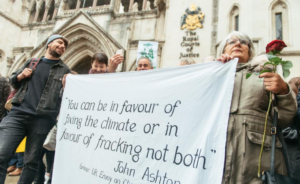The anti-fracking victory yesterday should not distract from disturbing trends in the criminalisation of dissent.
Three anti-fracking protesters – Simon Blevins, Richard Roberts and Richard Loizou – were sentenced to 15 and 16 months in prison for ‘causing a public nuisance’ in late September this year. A fourth protester, Julian Brock, received an 18 months suspended sentence after pleading guilty to the public nuisance charges.
The ‘Frack-Free Four’ had been arrested during a ‘month of protest’ in the summer of 2017 that aimed to disrupt exploratory drilling activities at Cuadrilla’s Preston New Road fracking site in Lancashire. The four climbed onto lorries that were delivering part of a drill rig and remained there for up to four days impeding the vehicles’ movement to the fracking site.
Their sentences were overturned, with the judge acknowledging that they were “manifestly excessive”. It was a huge victory for the anti-fracking movement, and for everyone concerned about the right to protest in the UK and beyond.



